YOKOHAMA, December 8, 2007 -- Semmy Schilt of Holland turned aside all challengers tonight to win the K-1 World Grand Prix 07 Final at the Yokohama Arena. Schilt's third-consecutive WGP Championship is unprecedented in K-1 history. Along with fightsports' most coveted belt, the 34 year-old seidokaikan karate fighter also picked up a winner's purse of US$400,000.
The 15th annual K-1 WGP Final followed the sport's classic eight-man tournament format: Four first-tier bouts advancing a quartet of fighters to the semifinals, the winners there squaring off in the final. All bouts were contested under K-1 Rules, 3min x 3R, with two possible extra tiebreaker rounds.
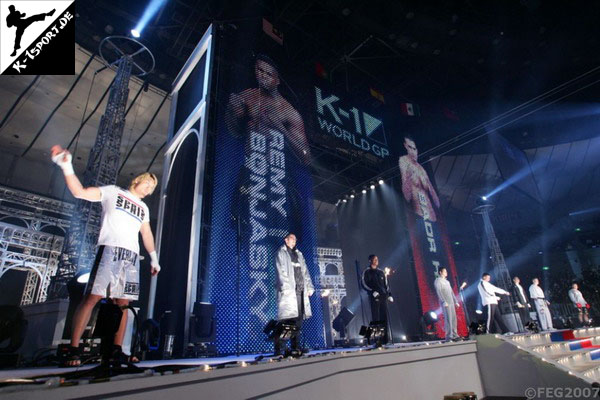
Opening Ceremony
The first tournament quarterfinal saw veteran kickboxer Jerome LeBanner of France step in against gargantuan South Korean Hong Man Choi, a former ssirium wrestling Grand Champion.
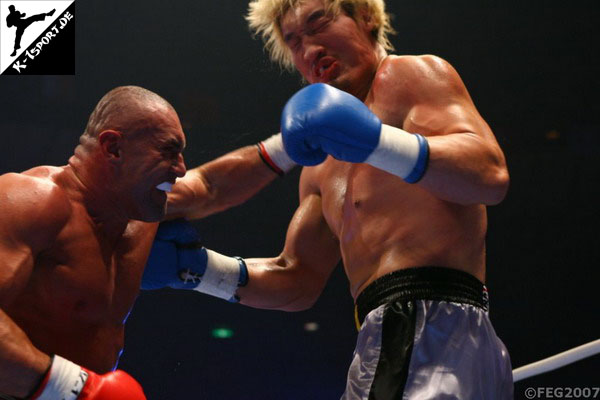
Jerome Le Banner vs. Hong-Man Choi
Choi's 28cm/11" height advantage was strikingly evident when the pair met center ring for the referee's pre-fight instructions. LeBanner had joked beforehand that he would have to "bring down a tower," and took up the task from the start, darting in with a left straight and pumping in a right to the body. Throughout the first round LeBanner circled with good evasions, coming forward quickly to score with the left and low kicks. In the second the Frenchman led with the left, and brought a nice right cross over his opponent's guard. Choi did not appear to be bothered by the blows, and rattled LeBanner with a hard left hook late in the round to stay close.
LeBanner made the third thrilling, closing fearlessly with the overhand before coming round from behind to tag the retreating Choi's chops with a right. Surprisingly, Choi made few attempts to bring the knees into this fight, connecting for the first and only time midway through the third. It was too late, though, as the big Korean was now fatigued. As Choi slowed, LeBanner intensified his punching attacks, putting up points with tight combinations to earn a unanimous decision and a trip to the semifinals.
The second quarterfinal pitted Semmy Schilt against Brazilian kyokushin master Glaube Feitosa. This was the first of three wins on Schilt's road to victory, and it was also the hardest.
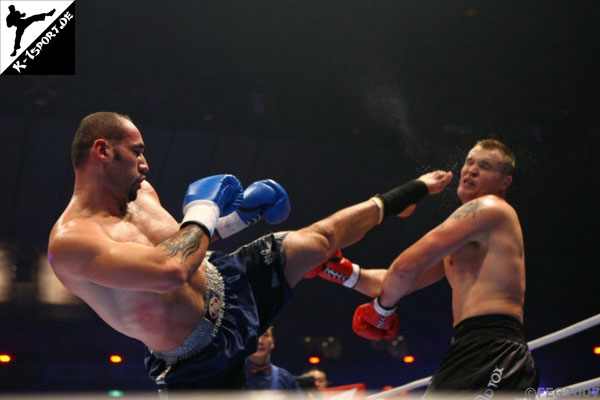
Glaube Feitosa vs. Semmy Schilt
The two fighters traded low kicks to start, Feitosa with speed, Schilt with power. Feitosa made partial contact with a high kick, while Schilt closed to fight with the knees. No significant damage in the first. The second saw Feitosa with his guard high and close, patiently taking what Schilt was dishing out -- before suddenly firing up a beautiful kyokushin kick that caught the side of Schilt's head hard. It was the strike of the fight, and the crowd rose to their feet as a stunned Schilt wobbled awkwardly backward. Schilt very much looked like he was going down, but his fall was arrested and his balance restored by the ropes. Seeing his chance, Feitosa chased the dizzy Dutchman with fists, but could not finish. The round ended with a recovered Schilt throwing hard low kicks, jabbing with the left and again coming in with the knees. In the third Schilt repeatedly tossed in the jab and hoisted the knees, while but for a decent left straight punch Feitosa could not bring any hurt to the big guy.
A spirited contest, and the WGP laurels might well have graced a different head had Schilt gone down in the second. But as it was Schilt came out of the bout having clearly put more strikes through, and took the win by unanimous decision.
The second bracket opened with Moroccan bad boy Badr Hari, the K-1 Heavyweight Champion, taking on two-time WGP Champion Remy "The Gentleman" Bonjasky of Holland. There is no love lost between this pair, who have lashed out at one another in interviews. This one was expected to be a war.
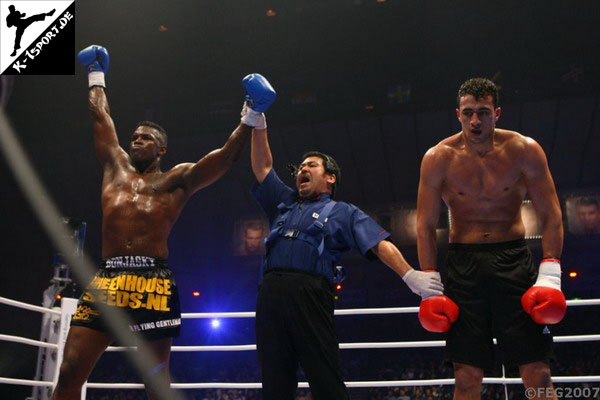
Remy Bonjasky vs. Badr Hari
And it was. An explosive start, speed and power characterizing the countless low kicks that flew in the first. Hari launched a nice high kick here, Bonjasky a flying knee; and both men also went pugilistic, Bonjasky going for the nose, Hari pumping the right to the body. More punch and low kick combinations to start the second before the fighters stood off some, searching for openings. Both kept the guards high and showed good blocking, a hint of animosity evidenced when Hari refused to touch gloves after Bonjasky had signaled a low blow. The pair did not touch gloves at the end of the round either. In the third, legs were further brutalized. Bonjasky threw several left hooks then smacked in a right kick to the top of Hari's leg, and the Moroccan looked to have slowed some by the final bell.
A close one, Bonjasky taking the third on all cards to prevail by the narrowest of majority decisions. But after absorbing so many hard low kicks, one had to wonder whether Bonjasky would be fit for the semis.
The last of the quarterfinals featured three-time WGP Champion Peter Aerts of Holland and 23-year-old Japanese kickboxer Junichi Sawayashiki.
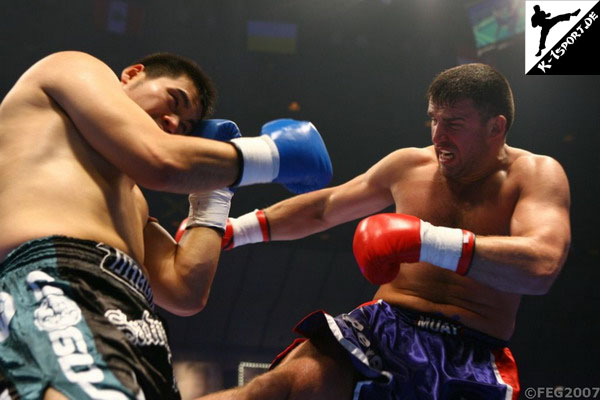
Junichi Sawyashiki vs. Peter Aerts
Aerts has competed in all 15 K-1 WGP finals, and the "Dutch Lumberjack" displayed his experience here, cutting his opponent down in just 89 seconds. Aerts started fast with low kicks to put Sawayashiki off-balance. A deftly-placed high kick then caught the Japanese fighter hard on the head for a down. Sawayashiki beat the count, but on resumption Aerts coolly threaded a right straight punch through for a second down and the win. Aerts looked nothing like his 37 years, while Sawayashiki just looked out of his element.
In the first semifinal it was Jerome LeBanner -- the lone non-Dutch fighter remaining in contention -- stepping in against Semmy Schilt.
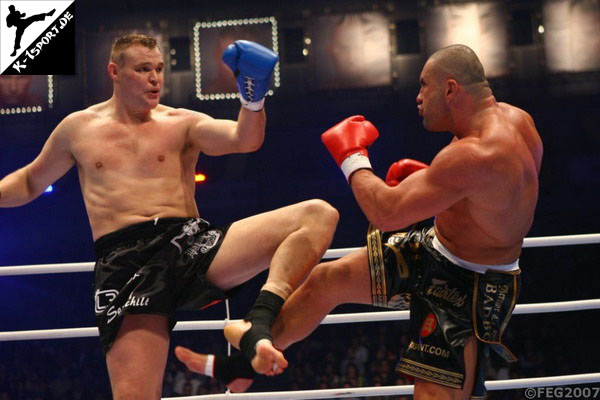
Semmy Schilt vs. Jerome Le Banner
From the bell LeBanner was the aggressor, and why not -- Schilt must have appeared small after Choi! The Frenchman cocked his head to the left and threw the overhand right to good effect, and Schilt was forced into retreat, pushing LeBanner back with front kicks. Schilt threw some hard low kicks and decisively reversed the flow at the clapper, bringing a hard right knee up to LeBanner's face then laying in with punches to end the round.
There was some confusion at the start of the second, when it appeared that LeBanner's cornermen might not leave the ring. LeBanner pulled rank, waving them out and starting in with a series of punch attacks. However it soon became clear from LeBanner's movement that his right leg was compromised. Schilt exploited this by firing in a low kick for a down. A distressed LeBanner beat the count, but his corner had seen enough and threw the towel, giving Schilt the win.
The second semi featured Remy Bonjasky, who had taken a heap of punishment in his first fight; and Peter Aerts, who had barely been touched in his.
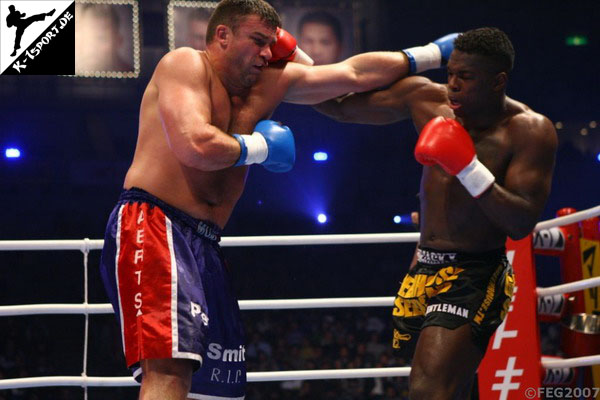
Peter Aerts vs. Remy Bonjasky
If Bonjasky was hurt he wasn't showing it, exhibiting fluid movement and throwing high kicks from the bell. Bonjasky went to the mat after an exchange of kicks, but this was ruled a slip. Aerts stood his ground, stepping in with the right straight punch, working the body and throwing low kicks along with a knee that slowed Bonjasky down some. Aerts went to the body again in the second, and the closed-up Bonjasky was now hopelessly on the defensive. After being cautioned for a lack of attacks, Bonjasky fired the fists onto his opponent's guard, Aerts responding by mockingly dropping his gloves and inviting Bonjasky in.
Fatigue had caught up with Bonjasky, who was listless in the third, rarely throwing anything and missing badly when he did. Aerts put low kicks in, worked the body again, and picked up enough points to win by comfortable unanimous decision.
The final between Schilt and Aerts marked the third meeting between these two -- Aerts taking the first fight, in Auckland in March of last year; Schilt equalizing in the Championship bout at the WGP 06 Final. The repeat of last year's final showdown provided a dramatic opportunity for the fighters to settle the score.
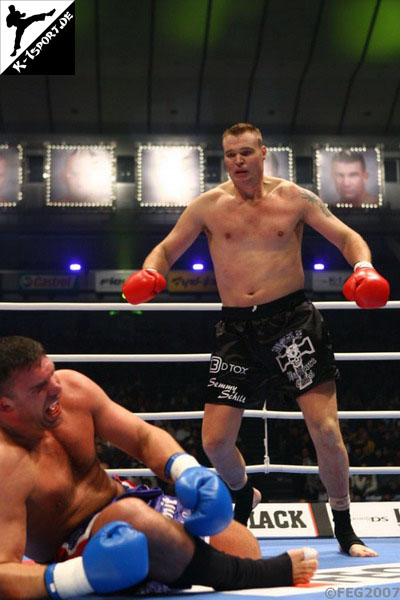
Peter Aerts vs. Semmy Schilt
Aerts may have been the crowd's sentimental favorite, but Schilt would not be denied. The bout began with Aerts moving in ambitiously with overhand punches. Schilt fended off the attacks with low kicks, and went to the clinch when the distance closed. Schilt soon corralled his opponent into the corner and brought up the knee, but Aerts escaped and found the space to resume his pursuit. Schilt put through a left straight punch that didn't look especially dangerous, but caught Aerts square on the chin. Unfortunately for Aerts, as he stumbled backward his right knee buckled, and he fell to the canvas smarting less from the punch than its side effect. With pain etched on his face, Aerts grasped his failed knee, and could only listen in frustration as the count progressed. Aerts could not get up, and Schilt had the Championship.
"I'm very glad to win tonight and to make history by winning the Championship three years in a row," said a beaming Schilt in his post-tournament interview. "It was a good final, there were no easy fights. I think the first fight [against Feitosa] was the hardest, but the first fight is always the most difficult, it decides what happens in the other fights."

Semmy Schilt
Asked if the final with Aerts was a "dream fight," the normally stoic Schilt attempted a joke: "I think if you really want to see a dream fight you have to rent a DVD, like one of the Rocky movies…" Ok, now we know why Schilt is stoic.
Schilt's victory continues a Dutch domination of K-1 that is nothing short of astounding. The three Dutch fighters in tonight's WGP Final all won their quarterfinals, and were only eliminated by fellow Dutchmen; the K-1 WGP Champion has been a Dutchman for the last six years; and in K-1's 15-year history, a Dutch fighter has won the WGP 12 times.
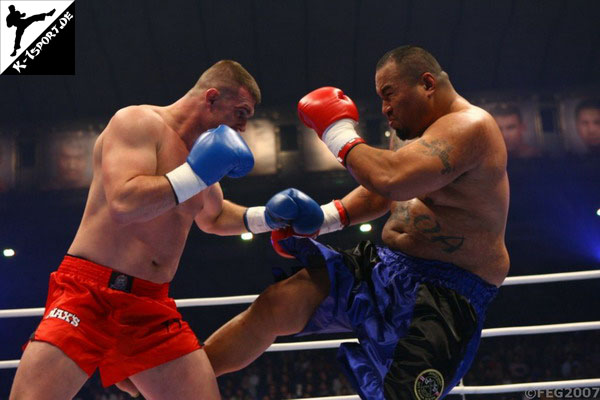
Paul Slowinski vs. Mighty Mo
In the tournament Reserve Fight it was Mighty Mo of the United States and Paul Slowinski of Australia. The squat Mo's right hook has been the bane of many an opponent; while Slowinski's karate background and conditioning afford him a more varied repertoire of attack strategies. Slowinski also had one of the greats in his corner -- Ernesto "Mr Perfect" Hoost.
Slowinski answered Mo's early punching charge with a series of low kicks, but Mo stepped through these to persist with the fists, a right opening a cut near Slowinski's eye and prompting a doctor's check. Mo was aggressive again after resumption, closing repeatedly and connecting well with the fists. In the second Mo again took the initiative, but now Slowinski made good on counters, leading with the left straight then firing in a hard low kick to drop the big Samoan. Mo looked like he might just beat the count, and the referee gave him ample opportunity to assume a fighting pose, but Mo could only respond with a grimace, and the fight was called, giving Slowinski the victory.
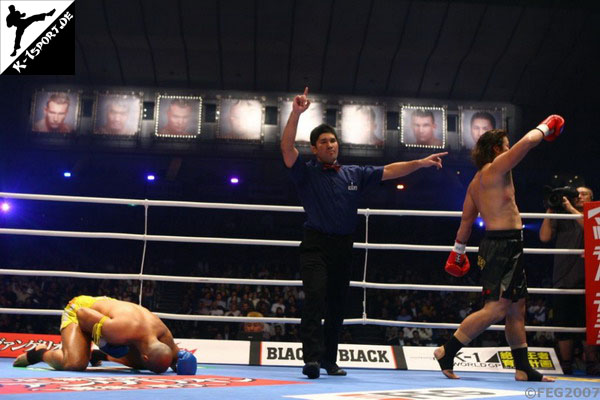
David Dancrade vs. Musashi
A Superfight saw veteran Japanese seidokaikan fighter Musashi take on David Dancrade, a French kickboxer making his K-1 debut. Dancrade threw low, middle, high and spinning back kicks in the early going, while Musashi blocked and took his time, testing with the occasional jab or low kick. But suddenly, at the clapper, Musashi fired in a left kick that caught Dancrade on the midsection and sent him to the canvas. The French fighter stayed there, unable to beat the count. A good fighter makes winning look easy by picking his spots, and Musashi's K-1 experience proved the difference here as he did just that.
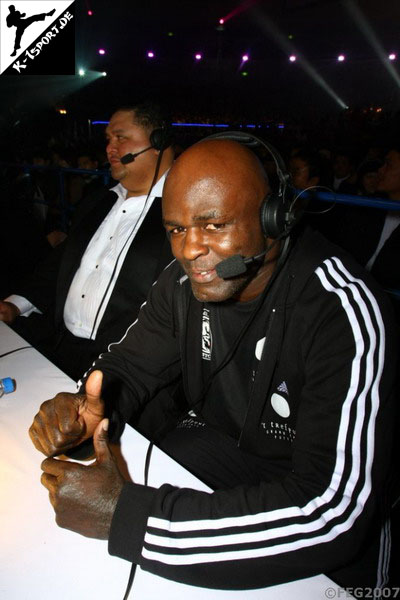
Ernesto Hoost Commentary
Also on the card, Jan "The Giant" Nortje from South Africa beat Dong Wook Kim by TKO when the South Korean could not continue after bashing his foot into The Giant's knee; Takashi Tachikawa of Japan scored a KO win over Ki Min Kim of South Korea; and Mitsugu Noda of Japan beat Noel Cadet of France by TKO.
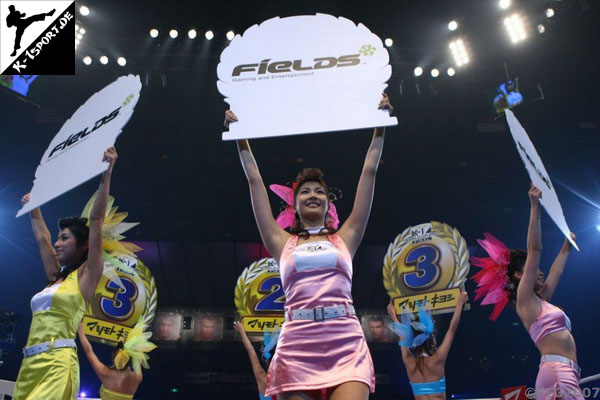
Ring Girls
The K-1 World Grand Prix 07 Final drew a boisterous sellout crowd of 17,667 to the Yokohama Arena. The event was broadcast live in Japan on the Fuji TV network; in Korea on XTM; in Hong Kong on PCCW; in Australia on Main Event; in Brazil on Globosat; in Canada on The Fight Network; in Romania on ProTV; in Hungary on RTL; and across Scandinavia on Viasat. Delay-broadcasts will bring the K-1 WGP 07 to a total of 135 countries -- for scheduling information contact local providers. Visit the K-1 Official Website (www.k-1.co.jp/k-1gp) for official results and comprehensive coverage of this and all K-1 events.


